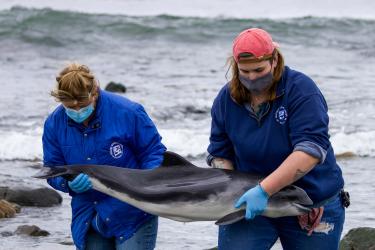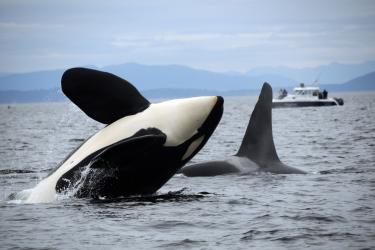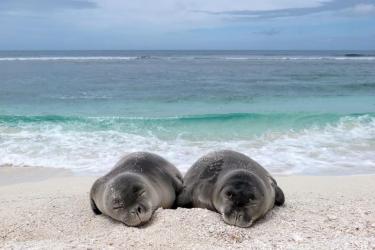Professional Specialty Groups are composed of representatives from NOAA Fisheries headquarters, regional offices and science centers, Fisheries Information Networks, and state partners. There are currently three PSGs: Coder, Pacific Highly Migratory Species, and Quality Management and Continuous Improvement. Through the PSGs and targeted competitive funding, FIS is improving and enhancing products at each phase of the fisheries-dependent data life cycle.
Coder PSG
Following the recommendations of the Fisheries Information Management Modernization initiative, FIS took the lead on establishing the Coder PSG in 2021.
The Coder PSG has created working groups to better understand how various resources are being used by different offices and regions, including one that is identifying the range of collaborative tools in use as well as their strengths and limitations. Based on its findings, the group will develop a network of resource pages for development teams throughout NOAA Fisheries. The PSG has also begun a project to catalog and analyze the composition of information technology teams throughout regional offices, science centers, headquarters offices, and partners to begin identifying potential gaps and best practices. Group meetings have featured demonstrations and presentations on topics including development pipelines and Federal Information Security Management Act compliance. Moving forward, the PSG will work to bolster the software development process across NOAA Fisheries. This will include efforts to scope and curate a shared IT knowledge center, and promote the use of centralized, integrated IT tools.
Highly Migratory Species PSG
The Pacific Highly Migratory Species PSG brings together data managers and users from the Pacific Islands, West Coast, Atlantic HMS program, and NOAA Fisheries headquarters with the mission of creating an integrated, accessible data system for highly migratory species in the Pacific. The group works in the areas of communications, electronic reporting and modernization, data reporting and business rules, and data sharing.
The PSG concluded the first phase of a collaboration among the Pacific Fisheries Information Network and the West Coast and Pacific Islands regional observer programs in 2021 to develop an electronic reporting application for pelagic HMS fisheries observers. Instead of paper forms, the Onboard Record Collection Application (ORCA) allows observers to instantly and accurately enter the vital data they collect using a tablet. The PSG also initiated a project to identify ways to improve tracking of the numerous business rules and data reporting requirements related to regional fisheries management organizations (RFMOs) and treaties to which the U.S. is a member. The work will ensure efficiency of effort in the communication, collaboration, and coordination of these submissions. And as the Pacific Islands region transitioned to mandatory electronic reporting for longline fisheries, the PSG has played an integral role in fostering support for the project by opening lines of communication among regions. It has also led a joint data access project with the Office of Science and Technology to enable permit holders to view the data collected aboard their vessels.
Pacific HMS Data Request Form
For users seeking West Coast and Pacific Islands Highly Migratory Species data, we have created this single-point form to facilitate requests. You will no longer need to email requests to individuals at NOAA Fisheries science centers or regional offices.
The form is pre-populated with the different data sources available. To facilitate the process, we ask that you please be as specific as possible with your request, and include detailed notes about the purposes of your data request in the comment field. This helps us ensure that we are providing the data that best meet your needs in the most suitable format.
Please note that before the request can be initiated, you will need to complete a nondisclosure agreement for both the West Coast Regional Office and the Southwest Fisheries Science Center, and/or both the Pacific Islands Regional Office and the Pacific Islands Fisheries Science Center, depending on which region you are requesting data from. Please download these forms using the links above, sign them, then upload them through the data request form. This is a legal requirement to ensure the confidentiality of certain data.
Upon submitting your request, you will receive a notification within three business days that it has been received, as well as a timeframe for processing your request.
To initiate a data request, please click here.
Thank you for your cooperation and support. Our team looks forward to supporting you in your crucial work.
Quality Management and Continuous Improvement PSG
The Quality Management and Continuous Improvement PSG helps enhance processes and improve data assets by collaborating across NOAA Fisheries and with our partners to embed QM/CI practices into organizational culture. Whether it’s combining complex and divergent information streams into a single, accessible data source, or creating a strategic plan to drive a good idea from the whiteboard to the field, the QM/CI PSG has tools, resources and funding available to help solve the everyday challenges faced by scientists, managers, and others who work with fisheries data.
The PSG worked with the Alaska Regional Offices Learning Team in 2021 to develop a series of trainings to teach AKRO staff quality management principles and introduce a set of tools to incorporate those principles as part of their work routine. Over the course of 10 weekly training sessions, participants received an overview of QM and introductions to 11 QM tools focusing on information flow, project management, and process mapping. The region now has a toolbox with templates and one-pagers hosted on its intranet for easy access and ongoing reference. The new toolbox can also serve as a model for other regions and partners to expand the practice of QM and promote process improvements throughout the fisheries data community.








